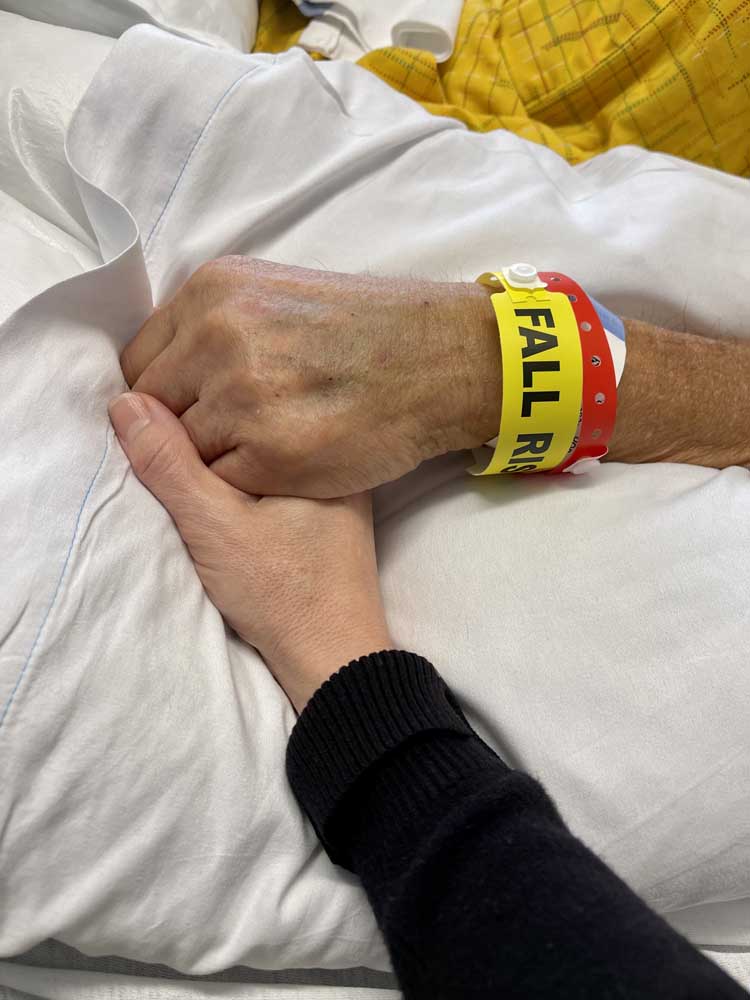Column: A year ago, Bend’s former mayor died homeless. His daughter’s message: compassion.
Published 2:15 pm Wednesday, February 14, 2024

- One of the stories that moved readers of The Bulletin in 2023 was the tale of Craig Coyner III, a former mayor of Bend who wound up homeless on the streets of the city he once guided. Here, his daughter, Catherine Emick, holds his hand as he received care at St. Charles Bend. Coyner died Feb. 14, having struggled for years with alcoholism and mental illness.
Craig Coyner III was once Bend’s mayor, but in December 2022, when I met him while reporting at a local shelter, he was homeless.
Six weeks later, I received an email from his sister. Coyner had been hospitalized with frostbitten toes, she wrote. He suffered a stroke and died that morning.
Trending
Today is Valentine’s Day and the 165th anniversary of Oregon’s statehood. It is also the one-year anniversary of Coyner’s death, a story that reverberated far beyond the city of Bend and crystallized a brutal truth: that tragedy and homelessness can happen to any of us.
This is how I reported that story, the impact it’s had since and, perhaps, what we can learn from it.
A former Bend mayor died homeless. What happened to Craig Coyner III?
Few people knew how Coyner had fallen so far. For five days, I interviewed his family and colleagues. I combed through hundreds of pages of records and historical archives.
Trending
In time, I learned how Coyner and his family left an indelible mark on the city of Bend. They helped develop and design buildings, parks and the city’s central thoroughfare, the Bend Parkway. His name adorned local landmarks, a trail, a point and two roads in Redmond.
But I also learned how his life spiraled amid family conflict, mental illness and substance abuse. The loss of his second wife, his father and his home during the Great Recession made things worse.
As reporters, interviewing grieving people is one of the most difficult but critical parts of our jobs. We must balance seeking truth while being careful not to deepen a person’s trauma. But reporting these stories can convey the human toll of tragedy and commemorate how a person lived.
Coyner’s family was gracious and honest while I interviewed them. Hours before we published the story, I sat with his daughter, Catherine Emick, in The Bulletin’s newsroom. There was much she didn’t know about her father, who had drifted away when she was young. I told her what I could.
The Bulletin published Coyner’s story on Feb. 20, 2023. It quickly caught statewide attention. I spoke about Coyner on a Portland-based television news station. News outlets statewide picked up the story, and the New York Times published its own story about him in April.
In 2023, more than 36,000 people read the story on The Bulletin’s website alone.
“I think (his story) put a very uncomfortable face on homelessness,” Emick said Wednesday. She added, “We have an image of what it was supposed to look like, and he was not what it was supposed to look like.”
Many people who read the story reached out by phone and email.
“Though I never met him, our lives had many parallels,” one person wrote.
“I didn’t know him, but then again I probably did. There are most likely many Craig Coyners in Oregon,” another person wrote.
“This is a story that needed to be told,” another person wrote.
Bend Mayor Melanie Kebler took a moment to remember Coyner at a city council meeting.
“None of us are invulnerable to tragedy or pain,” Kebler said. “All of us need help from other people at some time in our life … I ask our community to remember Craig Coyner as someone who stepped up to lead in his community, and who left Bend a better place than he found it.”
And as Oregon House lawmakers prepared to vote over housing legislation, Rep. Emerson Levy, D-Bend, spoke about Coyner’s story. When she read it, “my heart broke at the reminder that we are all human subject to the difficulties that may find us,” she said.
“We are at a crisis point and must move quickly to address our housing needs,” Levy told lawmakers.
The Oregon Legislature adopted the legislation, and Gov. Tina Kotek signed it into law.
As reporters, we seek to tell stories that illuminate the biggest issues facing our communities, and covering homelessness has become a priority for our newsroom. We seek to do this with empathy and humanity, highlighting the lived experiences of vulnerable people.
Over the past year, I have often wrestled with what we should take away from Coyner’s story. He was a deeply flawed and complicated man, but his family told me they wanted him to be remembered.
So, on Wednesday, I called Emick, his daughter, who was generous enough to take a moment away from another busy day raising three kids to speak with me.
Since the story published, Emick has been surprised by the number of people who have stopped to talk with her, including some who knew her father.
As a local behavioral health nurse, she has been face-to-face with the struggles faced by homeless people, particularly in the winter, when she cares for people and sometimes sees them discharged back out into the cold. Now, it’s different.
“It never felt good. It feels worse now,” she said. “There’s a face to it.”
Sometimes, Emick has struggled with regret, she said, wondering if she could have done more to help her father and if he would have accepted it. But she said she was glad to hear his story had an impact, particularly on people in the position to implement change.
She remains forgiving and grateful for the time she spent with her dad, knowing that his was but one of many stories among those struggling through mental illness and homelessness. And if people were to take away anything from his story, it’s this:
“Compassion wouldn’t be a bad thing to take away from it.”








